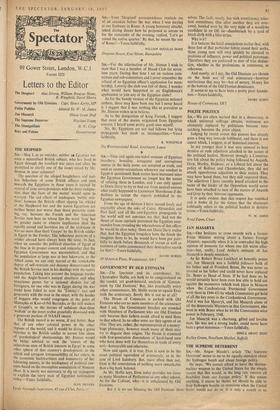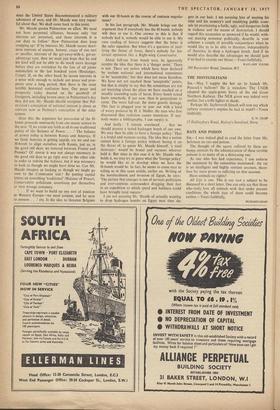THE SUPREME DETERRENT Sin,—Mr. Angus Maude's article 'The Supreme Deterrent'
seems to me to be equally mistaken about the hydrogen bomb and about foreign policy.
He says : 'We cannot afford to leave the thermo- nuclear weapon to the United States for the simple reason that this would, in the long run, remove all flexibility from our foreign policy.' If this means anything, it means he thinks we should be able to drop hydrogen bombs on occasions when the United States would not do so. It is only a month or so
since the United States discountenanced a military adventure of ours, and Mr. Maude was very resent- ful about that. We shall come back to this point.
Mr. Maude quotes Palmerston on allies. We must not have perpetual alliances, because only 'our interests are perpetual, and those interests it is .our duty to follow.' How Palmerston does keep cropping up! If by interests Mr. Maude means short- term interests of success, honour, coups of one sort or another, interests of the get-away-with-it, get-an- advantage type, then we must just hope that he and his kind will not be able to do much more damage before they are overtaken by the fate of all jejune nationalists in the last hundred years (Boulanger, Crispi). If, on the other hand, he means interests in a sense wide enough to include our peace and pros- perity over a long period, then there is the most terrible historical confusion here. Our peace and prosperity today depend on the goodwill of foreigners, including brown ones; in Palmerston's day they did not. Mr. Maude should recognise that Pal- merston's conception of national interest is about as relevant now as Ptolemy's conception of the solar system.
After this, the argument for possession of the H- bomb proceeds summarily from one manic seizure to the next ltwe retain any faith at all in our traditional policy of the Balance of Power. . . .' The balance of power today is between Russia and America. If we think America is getting uppish, are we and our H-bomb to align ourselves with Russia, just as, in the good old days, we teetered between France and Prussia? Of course it was not always necessary in the good old days to go right over to the other side in order to redress the balance, but it was necessary to look as though we might have done so. Can Mr. Maude imagine us looking as though we might go over to the Communist side? By putting capital letters on something 'traditional' (Balance of Power), Conservative politicians sometimes put themselves in very strange company.
. . If we want to build up any sort of position in Western Europe—we must possess, and be seen to possess . . .' etc. Is the idea to threaten Belgium
with our H-bomb in the course of customs negotia- tions?
In his last paragraph, Mr. Maude brings out the argument that if everybody has the H-bomb, nobody will dare to use it. One answer to this is that if nobody had it, nobody would be able to use it. My own reading of history suggests that the latter is
the safer equation. But when it's a question of justi- fying the threat of force, there's nobody for his- torical optimism like a Right-wing Conservative.
About fall-out from bomb tests, he ignorantly accepts the idea that there is a `danger point.' There is not. There are points which have been declared by various national and international committees to be `acceptable,' but that does not mean harmless.
We have not yet reached these `acceptable' points, but that is simply to say that the committees are not yet worrying about the place we have reached on a steadily ascending scale of harm. Every bomb tested hurts somebody, if not now, then in generations to come. The more fall-out, the more genetic damage.
This fact is plugged year in year out with a kind of weary patience by H. J. Muller, the man who first discovered that radiation causes mutations If any-
body wants a bibliography, I can supply it. .
And lastly : 'I remain convinced . . . that we should possess a tested hydrogen bomb of our own.
We may then be able to have a foreign policy.' That is a brutal and vacuous saying. The idea that a nation cannot have a foreign policy without basing it on
the threat of, to quote Mr. Maude himself, 'a total
destroyer.' would be brutal and vacuous whoever held it. But since in this case it is Mr. Maude who holds it, we may try to guess what the `foreign policy' he would like us to develop when we have the H-bomb would be. In fact, he seems to come near to telling us in this same article, earlier on. Writing of the bombardment and invasion of Egypt, he says: 'The picture that emerges is one of nervous politicians and over-cautious commanders dragging their feet in an expedition to which speed and boldness could have brought total success.'
I am not accusing Mr. Maude of actually wanting to drop hydrogen bombs on Egypt next time she
gets in our hair. I am accusing him of wasting his time and his country's and muddying public coun- sels by proclaiming a futile, ugly, and dangerous faith in violence and the means of destruction. I should regard this accusation as answered if he would, with- out making nonsense politically, describe in your columns a couple of possible conjunctures when he would like us to be able to threaten, independently of America, to drop a hydrogen bomb. And if he would also describe the advantages we should gain if we had to execute our threat.—Yours faithfully,



































 Previous page
Previous page